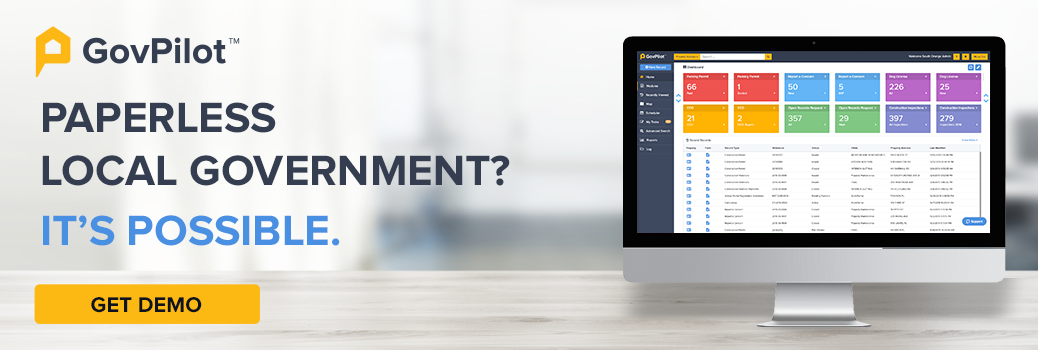The New Jersey state legislature recently took action to pass NJ law S1368, which requires all business and multifamily rental unit owners to maintain and show proof of certain levels of liability insurance. The new law also requires that businesses and multi-family home owners annually register a certificate of insurance with the municipality in which the business or rental unit is located.
As a local government official, you may be wondering why this law was passed, and what processes you’ll need to have in place given these new requirements for local businesses. Read on for everything you need to know about the NJ certificate of liability insurance law.
What is the NJ Liability Insurance Law That Passed in 2022?
NJ Law S1368 is a state law that passed on August 5, 2022 that requires local businesses and multifamily property owners to maintain certain levels of liability insurance and provide proof of said insurance to their local government.
The bill text requires, “the owner of a business or the owner of a rental unit or units [to] maintain liability insurance for negligent acts and omissions in an amount of no less than $500,000 for combined property damage and bodily injury to or death of one or more persons in any one accident or occurrence.”
Why Was Law S1368 Enacted in New Jersey?
Accidents happen, and liability insurance is critical to ensure that victims are compensated for injuries or damages and that a business or property owner isn’t forced to pay out-of-pocket or face a lawsuit when an incident occurs. The policy is meant to encourage business and property owners to be proactive instead of reactive. Additionally, the law puts pressure on local governments to hold business and property owners accountable with the annual collection of certificate of liability insurance policies.
What Does Your Local Government Need to Know About NJ Law S1368?
Your municipal government needs to make sure that local businesses and property owners are aware of the new liability insurance requirements, and that you have a plan in place for certificate of liability insurance collection. Here’s what you need to know:
-
Who is required (and exempt) from having liability insurance?
The NJ law requires all business owners and owners of rental unit(s) to have liability insurance with $500,000 as the minimum coverage requirement and to provide their local governments with certificates of liability insurance. The only exception is for , “the owner of a multifamily home which is four or fewer units, one of which is owner-occupied…” which only has to have $300,000 worth of coverage.
-
When does this policy apply to business and property owners?
The act was set to take effect 90 days after its enactment. Since the law passed on August 5, 2022, the policy became official on November 3, 2022 and applies, “to policies issued or renewed on or after the effective date.”
-
What does the new law require of local governments?
Municipal governments are integral to holding business and property owners accountable for acquiring liability insurance and providing your government with proof of their coverage. Your municipality will need to:
- Educate business owners and property owners of the policy changes: now that the law is official, make sure that required parties are informed of the policy and know how to submit proof of insurance.
- Collect certificates of liability insurance: your local government needs to collect documents showing proof of liability insurance. Consider offering online forms so that business and multifamily property owners can submit their annual records from your government website.
- Store certificates of liability insurance: as reports are filed annually, your locality will need to store the records in an organized fashion for future reference. If your local government is using government software, you can store these records in the GovCloud.
- Enforcement of law S1368: your local government can issue fines between $500 and $5,000 dollars to businesses and property owners that don’t acquire the required insurance and / or fail to submit their certificate of liability insurance. If your locality chooses not to pursue the enforcement of this policy, then the state Division of Local Government Services will do so to businesses within your jurisdiction.
-
Can your government collect fees for certificate of liability insurance form submissions?
Since the form collection requirement adds an additional workload to your clerk’s department officials, the state law allows local governments to, “establish a reasonable administrative fee for the certificate of [liability insurance] registration.”
Learn more about how to collect fees online with the guide to Local Government Fee & Fine Processing.
How Can Government Technology Help With Enforcement of This Law?
GovPilot government software allows businesses and homeowners to file their annual certificate of liability insurance documents online. The benefits this certificate collection approach include:
- Simple online applications that can be submitted anytime, anywhere from a laptop or cell phone (instead of in-person at a government building)
- Integration with credit card processing businesses for easy fee collection from your government website.
- Automation of the application process saves government administrative officials time that would have previously been allocated to helping people submit their liability insurance forms (and other application types) in person.
- Automatic storage of certificates of liability insurance in the government cloud. These documents are made instantly available to all government officials in just a few clicks, and are regularly backed-up.
- Easy access to property insurance records (and all other relevant property and business records) can be pulled up for any property in your jurisdiction via a 3D GIS map.
- Notifications can be automatically sent to all relevant property and business owners to remind them of their annual filing requirement for proof of liability insurance.
To learn how GovPilot can improve workflows related to law S1368 and beyond, schedule a free demo.
Learn more about how GovPilot helped NJ governments embrace a digital transformation:
- How Jackson, NJ Went Fully Digital with GovPilot
- Streamlining Lodi, NJ’s CCO Collection Process
- How Trenton, NJ Used GovPilot to Raise Millions in an Online Real Estate Auction
- How Sea Girt, NJ Handles Citizen Complaint Management & Inspections Online
NJ Liability Insurance Law FAQs
What is NJ Law S1368?
NJ law S1368 is legislation passed in 2022 that requires business owners and multi family property owners to acquire liability insurance and to provide their local government with a certificate of insurance annually.
How Should Local Governments Collect Proof of Liability Insurance?
The simplest, most efficient way to accept submission of certificates of liability insurance is to add the form to your government website. Business and property owners can upload their paperwork and hit submit in just a few clicks, and the document will automatically be stored in the GovCloud and made accessible to government officials instantly.
What Government Software Can Help With Liability Insurance Collection?
NJ local governments were recently instructed to offer electronic permitting applications via their government website to streamline filing and approval processes via the cloud. Luckily, this same government technology can be used to allow business and property owners to file their certificate of liability insurance with just a few clicks. With GovPilot, you’ll simply have to select the insurance form application as a module and the application will be quickly made accessible from your site.
Do you need to pull up certificates of insurance records for a particular business or property in your community? GIS mapping technology allows you to find certificates of liability insurance and all other forms filed for a property instantaneously.
Why Do NJ Businesses and Rental Properties Need Liability Insurance?
Liability insurance is critical to ensure that in the wake of an accident on a business or property owner’s premises, both the property owner and victim are covered. The law ensures that business owners won’t have to pay out of pocket in the wake of an accident.
Does Your Local Government Need to Enforce Law S1368?
The law gives local governments the option to enforce S1638 by issuing fines between $500 and $5000 dollars. If your local government decides not to hold businesses and property owners within your jurisdiction accountable directly, the state government will handle the issuance of penalties within your community.
Read On:
Sources
https://www.investopedia.com/terms/l/liability_insurance.asp










